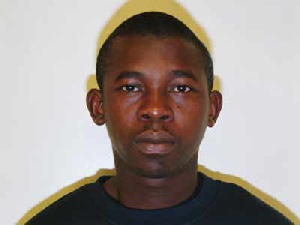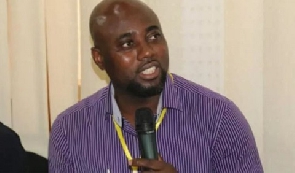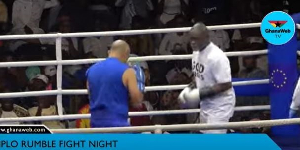Opinions of Friday, 10 August 2007
Columnist: Tawiah, Benjamin
Kwaku Manfo Asiedu: A Terrorist or a Terrorwrist?
The same week that terror generalissimo-Osama bin Laden’s-son married a five-time divorced British woman in Egypt, four of Kwaku Manfo Asiedu’s crime mates were jailed for their involvement in the failed July 21, 2005 bombings in London. Hassan Osman, Muktar Said Ibrahim, Yassin Omar, and Ramzi Mohammed, were jailed for life by the Woolwich Crown court in London after wasting the tax payer’s resources in months of legal up and downs, as due process will have it. They will serve at least 40 years behind bars. Our brother Kwaku Manfo Asiedu, proper name Sumaila Abubakar and another fellow, Adel Yahaya, are to receive a retrial. The jury had reached a deadlock in their deliberations regarding the Ghanaian accomplice. Will he be as lucky as Daasebre Dwamena or the laws of the United Kingdom will make an ass out of him?
When a suspect is retried in a common law jurisdiction, the understanding is that the evidence before the prosecution is not enough to press a charge. It could also be due to interference in the legal process or when there is the suspicion that the nature of the evidence available may prejudice the decision of the jury. Of course, the composition of the jury could have everything to do with a retrial. Well, the criminal lawyers know better. In Kwaku’s case, it is reported that the jury has not been able to reach a decision.
Now that the dust has settled on who Kwaku Manfo Asiedu is, we could attempt some analysis and interpretation of the character he presents. We have seen what he looks like: in a way, his face fits the description Wole Soyinka gave W.H Auden: ‘a compressed lump of volcanic lava in controlled convulsion.’ Well, not quite, for Kwaku is a nice Ghanaian gentleman whose Adankodeka ears remind me of a popular Music For You presenter on GTV years ago. We also know that Kwaku Manfo Asiedu is not his real name; it is a borrowed identity. The terrorist aspect of his character is what remains to be known. All we have been told so far is, he overstretched an arm of friendship to some evil fellows and ended up as the man who buys Hydrogen Peroxide in wholesale quantities for the manufacture of bombs. He was involved or had helped in the chemical preparation of the bombs: it involved mixing the hydrogen with chapatti flour and other ingredients. He had kept faith with the masterminds and taken his share of the bomb, which he had agreed or knew was to be detonated on the London transport system to kill commuters. He had lost his nerve and threw away his portion, later feigning innocence.
If his intentions have been established, and he actually held the device meant for bombing, why is his case becoming complex? Well, the law is not that much of an ass; it usually seeks to explore the intention behind the intentionsity. Kwaku could walk home a free man to see his wife’s pretty face, if she is that pretty. Of course, he would not receive a hero’s welcome; nobody is happy that he nearly succeeded in putting Ghana on the terrorism map. He is either a very big fool whose buffoonery got the best of him or he must thought he had something to gain by helping others with their evil plans.
There have been several conspiracy theories on Kwaku’s case. The most plausible one is that Kwaku never intended to be a terrorist when he met his friends. The dutiful Muslim that he is, he had gone to pray with them in the mosque, and they sold him the idea over time. It was, methinks, going to involve some big money, which as we usually suspect, the terrorist would give to their relations before they carry out the disaster, which ultimately would catapult them to martyrdom. Kwaku might have taken the money but was also nursing his escape to Sorbibor. He would feign interest in the plot but would chicken out on the agreed date, in the hope that his colleagues will bomb themselves. After that he would sneak quietly to enjoy his cash and thank Allah for his protection. Nobody will know, because his friends will be dead. But all failed when the bombs did not detonate. He lurked in the corners of town, waiting to hear the big bang. There was no bang, except the miraculous bang of the arrest of the others. There, Kwaku knew that the witches of his homeland had let him down. So, he became a real Kwaku Ananse, threw away his packet of ammunition and reported himself to the police, wearing his usual good boy face, as if the British national anthem was composed by Bob Okalla.
If I were ever to break into film making, this Ananse story could be my debut. But, this is no Ananse story; it is a story of a group of young men who sought to end young lives and break limbs for no clear reason, except the desire to main and destroy for the glorification of evil. That is what terrorism is all about. It is extremism gone very extreme. Anti terror laws also work like other laws: they establish the extent of an extremity based on available evidence. Kwaku may well appear a terrorist, but he may be holding some crucial evidence to the contrary. That is why his case has to be revisited.
What are Kwaku’s chances in this case? Why were there attempts to bribe him with some £650 in his cell, to persuade him to either falsify evidence or tell his story to fall in line with the narrative of his crime mates? There is a bit of intrigue here, and if Kwaku’s legal counsel is able to exploit this loophole very well, he could come out to find something better to do with his forever tainted life. Even if the evidence against him is overwhelming, he is not likely to receive the same punishment as his friends.
A pessimist is the man who would look left and right, and left again even when he is crossing one-way traffic. I was so frightened during the trial of Daasebre Dwamena that I must confess I wasn’t very sure the guy was going to escape jail. So when he did, I began to take people for their word. He had said he was not a cocaine distributor, and it came out that he wasn’t, at least in the eyes of the law. Kwaku’s isn’t any different: he ever held a bomb in his hands; he knew others who had bigger bombs meant for a sinister activity; he knew how far they had gone. But he says he is not a terrorist. May be, he is only a terrorwrist, in the sense that he had used his wrist to hold the device, not his mind.
Kwaku’s background will be useful in this case. He is from a country where nobody has ever been convicted of a similar crime. The West African country called Ghana, where a young guy called J.A Kufour is presently President, is known for her cocoa and gold than terrorism. Terrorists are normal human beings who think abnormally, and often they are trained and nurtured to believe in the extremes of normality. Kwaku had not received any such training; his ring leader had received his in Pakistan, and he had taken lessons in a college in England, to learn how to mix chemicals to produce explosives. Some of the other friends had prior knowledge of the process. Kwaku may have been recruited not long after he came to the UK. He may have fallen into bad company, and perhaps deceived into believing something his nature would usually not have him believe.
The prosecution may also consider the circumstances under which Kwaku lost his nerve and discarded his device. He had made his way to a park instead of the train station, where the explosives were to be used. What kind of a guy would spend months preparing for a joint activity to be held on an agreed date, only to abandon it in the long run? It is clear that if the explosives had detonated, he would not have been anywhere near the carnage. He hasn’t got the mind of a sadist, if intention is anything psychologists would consider. It is commonsensical to assume that if he knew from the time he started buying Hydrogen Peroxide in big quantities that he wasn’t going to destroy himself and others, he may have done all he did under duress. His friends may have exploited his naivety or his buffoonery, or both. He was new in the country and must have felt that natural need to belong, like we all do. It only happened that he belonged to a bad group. It holds true, therefore, that if he had fallen into a group of charity workers, Kwaku would today be doing charity work for the poor people in the world.
The unusual thing about Kwaku’s case is the bad blood that has developed between him and the other bombers. If they were of one accord from the preparation of the explosives to the bombing date, they should be singing the same tune now. Instead, serious antagonism developed between Kwaku and the rest of the boys, such that their sitting arrangements in court were altered. His defense has been that they had sought to drag him into something he usually would not do.
Even so, we should remember that among other charges, Kwaku has been accused of conspiracy to cause death with explosives. The word of interest here is ‘conspiracy.’ In contract law terms, for the enterprise smells of something contractual, (kill for martyrdom and seven virgins) Kwaku would be deemed to have provided consideration to the contract: he willfully provided material support to the programme. It is reasonable to ask whether Kwaku would have reported himself to the police if his friends had succeeded in bombing themselves. If he was that well-intentioned, why didn’t he tip the police before 21 July? If he had done that he would have been a true martyr, and perhaps gotten the Queen’s granddaughter for a good friend or a warm handshake from the Queen herself.
But Kwaku did not do this; he watched on while his friends took positions, ready to blast Londoners on the underground. If he didn’t want this to happen, why didn’t he cry wolf? In effect, he could well have given his bomb to a braver chap to detonate it on his behalf. Either way, innocent people have been killed needlessly. Is Kwaku Manfo Asiedu the kind of man we would trust next time?
Again, this is a guy who was alleged to have traveled to the UK on a Ghanaian passport bearing the name George Nayak. His real name is Sumaila Abubakar. He is now standing trial as Kwaku Manfo Asiedu. The next minute, he would say he is Kwasi Tawiah.
Meanwhile, the real Kwaku Manfo Asiedu, son of Police chief K.K Manfo, is disturbed that his father’s good name has suddenly become terrorist friendly. The trial continues.














